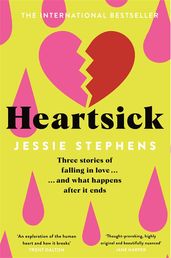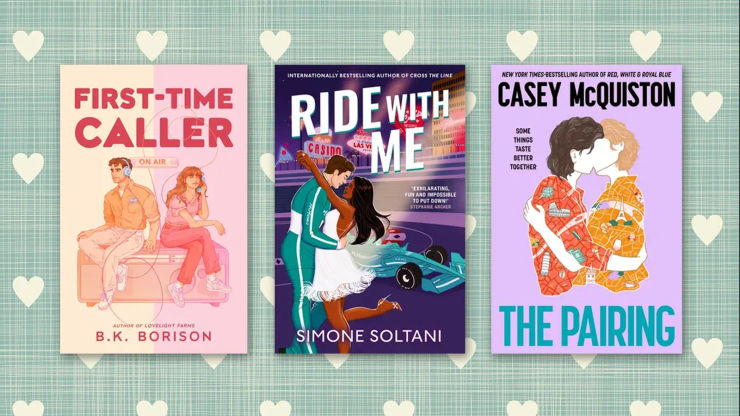Why isn't heartbreak a brand of grief we respect?
We lack a language for heartbreak, with men in particular being left high and dry when it comes to expressing their loneliness and desolation. Heartsick, a collection of three non-fiction stories of heartbreak from author Jessie Stephens, aims to equip us better, and even show how we can grow from the experience.

What becomes of the broken-hearted? Jessie Stephens, Sydney-based writer and Mamamia podcaster, wanted to find out. She interviewed three people who have, like many of us, experienced the crushing lows of heartbreak and its attendant loss of ego. The good news? There's an upside, if you allow yourself to connect and discover it. Stephens employs empathy and great storytelling skills to evoke the particular narratives of her three subjects, and to discover what connects them – and all of us who have ever loved and lost, throughout history.
‘Heartbreak doesn’t cease to exist when we fall in love again. Like all forms of grief, it morphs but it doesn’t disappear.’
‘Heartbreak’ is a word that sounds like it belongs in the diary of a 15-year-old girl. We might imagine a phone call going unanswered. An awkward conversation. A crush that doesn’t reciprocate.
It sounds like the sort of thing you might laugh about with girlfriends in your forties, while your children play by the pool, and you reflect on how everything worked out just as it should. That could not, however, be further from the facts of life.
Despite the poems of the Romans or the myths of the Greeks or the stories of the Persians, heartbreak remains a form of grief we do not quite know what to do with. It’s ugly, because self-loathing is ugly, and it’s innately private, because, most of the time, no one else has access to exactly what we are grieving. The moments we mourn are ones shared between us and one other person – and that other person is no longer available to speak to about them.
Anyone who has experienced true heartbreak knows that it can feel as though your whole life has ended. It’s an upheaval of everything we once knew. A way of erasing a future we assumed belonged to us, because we had designed every part of our lives around a particular person. It throws our lives into chaos, not only because of the significant loss, but also the ensuing personal crisis that forces us to examine our own self-worth. The deepest fear held by so many of us is the possibility that we might not be 'enough.' To be rejected by a romantic partner can feel a whole lot like being told we’re not.
So what sorts of cultural scripts do we have to respond to this kind of grief? We recite cliches about 'there’s plenty of fish in the sea' or 'time heals all wounds' or 'get back on the horse,' which basically just translates to mean I’ll just leave you to get on with it then.
In movies, we eat some ice cream while our mascara runs down our cheeks, and then we get a montage where we change our hair and the way we dress which almost always ends with us falling in love with someone even better. And that’s if we’re, again, a young woman.
‘In movies, we eat some ice cream while our mascara runs down our cheeks, and then we get a montage where we change our hair and the way we dress which almost always ends with us falling in love with someone even better.’
Heartbreak, though, doesn’t belong to women and it certainly doesn’t belong to the young. Men have virtually no script to refer to. No ritual. Many of us have no language to draw on that even comes close to putting into words how we feel.
After 12 months of studying heartbreak through three people’s stories, I think part of the process needs to be sitting in the muck for a while. This means letting ourselves feel things we don’t want to. The self-loathing and the jealousy and the destruction of our ego. It’s horrible but it’s also transformative. We learn that it is when we feel our most alone that we are in fact our most connected – connected with all the civilisations that came before us and felt exactly the way we are feeling now. Heartbreak, in that way, is a gift. It is also the price we pay for love. If writing these stories taught me anything, it’s that the love story still happened. It doesn’t go anywhere because it ended, and it isn’t any less legitimate. Would we take the love story back, if we knew what a risk it was? The answer is almost always no.
And then there’s ritual. We trivialise discussions around whether to delete an ex-lover from social media or if we should throw out all their things. But these are desperate attempts to design a ritual around a significant life event that lacks any. We have funerals and weddings and farewells and birthday parties. They are markers of time. They announce to the world that this is a thing that matters. So go through your phone and delete a number. Or write a letter that you never send. Or talk or reflect or do whatever helps to signify an ending.
Finally, there’s an opportunity to be honest with ourselves and each other. I spoke to a man in his sixties, happily married for most of his life, with children he loves more than anything, who wept for a girl who broke his heart in high school. Heartbreak doesn’t cease to exist when we fall in love again. Like all forms of grief, it morphs but it doesn’t disappear. When we share our shame-filled experiences of heartbreak it’s ultimately liberating. We are not pathetic or weak or ‘not enough’.
We are simply human.
Heartsick
by Jessie Stephens
Based on three real-life stories of heartbreak, international bestseller Heartsick is a non-fiction account of the undeniable lows – and the unexpected highs – of heartbreak. Claire can't wait to bring her partner Maggie home, but as they built a life together the connection between them begins to fracture. Lonely student Patrick is excited to meet Caitlin, but are her feelings as strong as his? Ana is happily married with three children when, one night, she falls swiftly in love with someone else. Both poignantly specific and utterly universal, heartbreak can break us, but it can also remake us. This is a narrative, above all, about healing.



